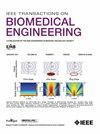Augmenting Robot-Assisted Pattern-Cutting With Periodic Perturbations: Can We Make Dry Lab Training More Realistic?
IF 4.4
2区 医学
Q2 ENGINEERING, BIOMEDICAL
引用次数: 0
Abstract
利用周期性扰动增强机器人辅助图案切割功能--我们能否让枯燥的实验室训练更加逼真?
目的:远程机器人辅助微创手术(RAMIS)与开放式手术相比具有很多优势,但 RAMIS 的训练仍需优化。现有的运动学习理论可以改善 RAMIS 训练。然而,目前基于简单动作的知识与 RAMIS 外科医生更复杂工作所需的训练方法之间存在差距。在此,我们研究了外科医生如何应对随时间变化的扰动:我们使用达芬奇研究工具包,研究了随时间变化的力和运动扰动对学习圆形图案切割手术任务的影响。54名参与者被分配到两个实验中,每个实验分为两组:无扰动训练的对照组和1赫兹扰动训练的实验组。在第一项实验中,力扰动交替地将参与者的手沿径向向内和向外推。在第二个实验中,扰动构成了任务平台的周期性上下运动:结果:接受扰动训练的学员学会了如何克服扰动,并在训练过程中提高了成绩,而在扰动消除后,他们的成绩并没有受到影响。此外,与没有扰动的训练相比,有运动扰动的训练使参与者在训练后遇到相同或其他扰动时更具优势:结论:周期性扰动可以增强 RAMIS 训练,而不会妨碍对扰动任务的学习:我们的研究结果表明,使用包含扰动的高难度训练任务可以让外科学员更好地为他们在手术室面对病人时所处的动态环境做好准备。
本文章由计算机程序翻译,如有差异,请以英文原文为准。
求助全文
约1分钟内获得全文
求助全文
来源期刊

IEEE Transactions on Biomedical Engineering
工程技术-工程:生物医学
CiteScore
9.40
自引率
4.30%
发文量
880
审稿时长
2.5 months
期刊介绍:
IEEE Transactions on Biomedical Engineering contains basic and applied papers dealing with biomedical engineering. Papers range from engineering development in methods and techniques with biomedical applications to experimental and clinical investigations with engineering contributions.
 求助内容:
求助内容: 应助结果提醒方式:
应助结果提醒方式:


